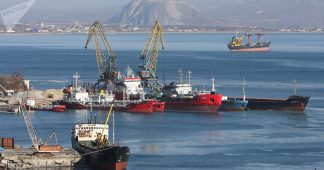In what has emerged as the most significant escalation to result from the Qatar diplomatic crisis – which pits two of OPEC’s largest oil producers, Saudi Arabia and the UAE, against the world’s biggest exporter of liquefied natural gas and further disrupts stability in the region – the biggest Middle East oil and container ports banned all vessels sailing to and from Qatar from using their facilities.
According to a notice posted on the website of Inchcape Shipping, Saudi Arabian and Bahraini authorities closed off all of their ports to Qatari-flagged vessels or ships traveling to or coming from the Persian Gulf state, in what has been described as a naval blockade.
#SaudiArabia and its allies are effectively running a sea blockade on #Qatar — #OOTT #oil #OPEC #QatarCrisis https://t.co/bZpTuTkPhr
— Javier Blas (@JavierBlas2) June 6, 2017
As Bloomberg adds, container and oil terminals in the United Arab Emirates also closed off traffic to any ships touching Qatar.
Saudi Arabia’s eastern coast is home to the port of Ras Tanura, which state-owned Saudi Arabian Oil Co. says is the biggest crude terminal in the world. Jebel Ali port, the region’s biggest container terminal, will be restricted from Tuesday until further notice, its operator Dubai’s DP World Ltd. said in an emailed statement according to Bloomberg. In the U.A.E., DP World operates Jebel Ali along with Dubai’s Mina Rashid and Mina Al Hamriya ports. Elsewhere, government-owned Abu Dhabi National Oil closed its crude and refined-product ports to any vessels to or from Qatar. The port at Fujairah, a main oil transit and refined product hub, said Monday it was closed to Qatar-linked traffic.
For now, shipping at Egyptian ports was operating normally as of Tuesday, according to Inchcape. The company also said the Suez Canal Authority has advised that there aren’t restrictions on vessels in the waterway since it is an international route.
Separately, Bloomberg also reported that A.P. Moller-Maersk A/S, which owns the world’s biggest container line, said it can no longer get cargo to Qatar as a result of the Saudi-imposed blockade of transport to and from the Gulf
state.
Though the situation remains “very fluid,” with updates expected throughout the coming hours, Maersk Line expects “disruptions to our Qatar services,” spokesman Mikkel Elbek Linnet said in an emailed statement on Tuesday.
For now, “we have confirmation that we will not be able to move cargo to or from Qatar,” he said.
Maersk Line doesn’t use its own vessels to bring cargo to Qatar, but relies on third-party so-called feeder services from the United Arab Emirates Jebel Ali port in Dubai.
“We will notify our customers on alternatives as soon as possible,” Linnet said.
Maersk ships about 16 percent of the world’s seaborne freight, making it the global leader in container transportation. Maersk, which has been working on splitting off its energy business to concentrate on its transport operations, said last year it lost the biggest oil field in its portfolio when Qatar ended a 25-year partnership with the Danish company. The agreement allowing Maersk to operate the Al Shaheen offshore field expires next month, after the company lost its bid for renewal to Total SA.
In addition to crippling overall Qatar-bound trade, the sea blockade will hurt shipments of oil and refined products from the world’s biggest energy exporting region.
According to Per Mansson, a shipbroker at Affinity Shipping in London, the Saudi ban on vessels going to and from Qatar will create logistical difficulties for some combination charters of crude oil supertankers from the Persian Gulf and will likely increase the use of smaller vessels.
“It will be a little more difficult, it will be a little bit more tricky for certain charters”: Mansson said, noting that there are “not huge quantities” of oil being exported from Qatar relative to other Gulf states.
Afffinty also says that the combination charters, where loading occurs in more than one nation, are popular on routes to Japan, Korea and adds that the use of Suezmax and Aframax ships on Qatar routes may increase. That said, companies could still book combination charters with Qatar and other nations that don’t have restrictions, including Iran and Iraq.
Yet while the shipbroker tried to talk down the potential impact of the shipping ban, according to Bloomberg oil strategist Julian Lee, blocking vessels going to/from Qatar is probably the most important direct move that Saudi Arabia has made in terms of hindering its smaller neighbor’s ability to export crude oil and condensates.
Saudi Arabia’s move mirrors similar restrictions by United Arab Emirates, which will mean ships going to/from Qatar no longer have access to the Middle East’s biggest refueling center at the port of Fujairah.
According to Bloomberg, 27 of 31 vessels that loaded Qatari crude, condensate in May co-loaded in either Saudi Arabia or the UAE.
The good news is that aside from the above, Lee believes that there is little reason – so far – to believe that measures against Qatar will have a materially negative impact on country’s energy exports.
***
Finally, there is the question of LNG shipments. Here, as Reuters reported earlier, LNG traders took a wait-and-see approach, alert to potential disruption of regional energy flows “but erring on the assumption that any trade shocks could be contained given well supplied global markets.”
Qatar’s top clients in Japan and India quickly received reassurances that supplies would continue as usual. Whether this persists is unclear: within hours of the diplomatic break, the UAE barred all vessels coming to or from Qatar using its popular anchorage point off Fujairah. The ban impacts about six LNG vessels linked to Qatar now anchored in the Fujairah zone which may need to be moved out, according to shipping data on Thomson Reuters.
But there was little sign yet of LNG supply being hit.
“I cannot see this impacting exports of Qatari LNG outside the Arab world at all and it won’t likely impact LNG and gas pipeline exports within the Arab world either,” Morten Frisch, an independent LNG and gas industry consultant, said.
Still, traders startled by the development began to plan for all eventualities, especially any upsets to piped gas supplies from Qatar to the UAE.
Egypt, while relying heavily on Qatari LNG brought in by Swiss commodity trade houses, is less vulnerable than the UAE because it has no direct deals with Qatar, domestic gas output is squeezing out the need for imports, and traders would be liable for any moves by Qatar to restrict exports.
“Trafigura, Glencore and Vitol frequently take LNG from Qatar and deliver it to Egypt but they take ownership of the cargoes at the Qatari port and don’t use Qatari ships, meaning technically that Qatar shouldn’t have sway,” one trade source said.
In reality though, Qatar can block exports to certain countries by issuing so-called destination restrictions.
“It’s not clear yet,” another LNG trader said of potential impacts to deliveries from Qatar to Egypt.
***
Can (and will) Qatar respond to the blockade?
Retaliatory measures such as suspending LNG supply deals would leave Qatar free to push more volumes into Europe where it has access to several import terminals. Under that scenario, trade houses with supply commitments to Egypt could turn to the United States, Algeria and Nigeria for replacement cargoes, traders and industry sources told Reuters.
The deterioration in ties between Qatar and Egypt contrasts with 2013 when the producer gifted five LNG cargoes to Egypt – when Mohamed Mursi, leader of the Muslim Brotherhood, served as president. Ironically, it is Qatar’s support for the MB – if only according to the “official narrative” – that is the catalyst for the current crisis.
Featured image: Gregory Hawken Kramer, CC BY-SA
 See bigger picture here
See bigger picture here











